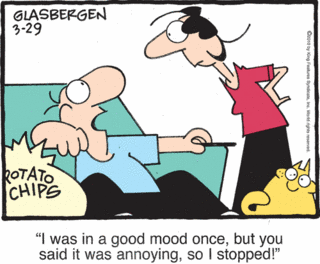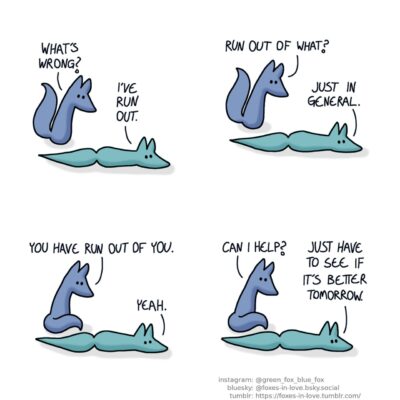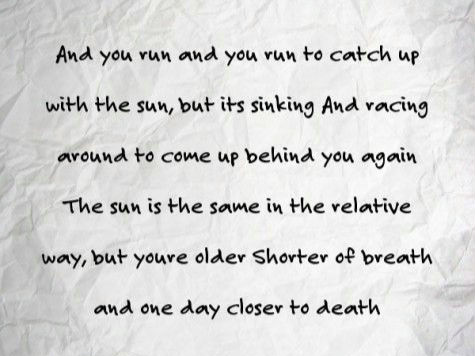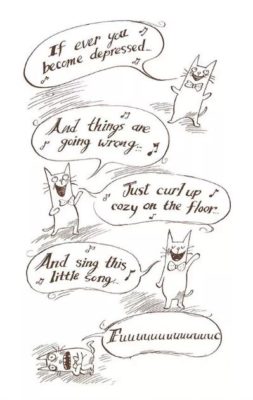I live on the hope that tomorrow will be a better day.
Tag: depression
Time: truer the older you get
It’s the most wonderful time of the year.
Or not. These past couple of years, the holidays have become less and less a time of joy and more and more a source of anxiety, frustration and honesty… depression.
Don’t get me wrong. There are moments I still treasure. They just seem to be more difficult to achieve and it involve more drama to get to.
I found a good article recently that had some advice I thought I’d share, just in case it can help someone.
Make a flexible plan: Make plans and then communicate them clearly with your family. Don’t overbook. Build time in, so you don’t have to rush, and leave time for yourself.
Set realistic expectations: You can’t do everything, so focus on what matters. Where do you want to put your energy? The holidays have a lot of “shoulds.” Don’t be afraid to say no.
Be open to new traditions: “But we always …” is not a reason to do something you don’t enjoy. If a tradition doesn’t work for you, make a new one.
Be aware of what you need: Get outside in the sunlight when possible. Get some physical exercise. Make sure you get the proper amount of sleep.
Stop it before it starts: Pay attention and self-diagnose. Are you experiencing a change in your eating or sleep patterns? Do you find yourself declining invitations you would normally accept because it seems like too much effort to go? Don’t ignore self-care and be mindful about how you are navigating the holidays.
Bad mental health day
Today is a bad mental health day, where everything seems bleak, with no obvious solution to problems that seem insurmontable. You wonder what’s the point, you ask yourself if it all matters. You want to stop caring, but you still worry about everything.
Then your cat comes to sit next to you, and you feel better for a bit.
And you hope tomorrow will be better.
There is alway the view of the lake
I sing this song every day
‘High-Functioning’ depression
This post was written more than 3 years ago and is still just as relevant now as it was then. Normally, I don’t really talk about my mental health, but I feel like this is one of those times when I need to. I feel like I’m swimming against the current. I do not see my depression getting better. I’m functional, barely. I am always tired. I have trouble concentrating. I feel that I am always anxious or angry and I’m not getting the help I need.
I came across this article today, and I’m going to copypasta some bits here. I originally wasn’t going to post this as a public post, but seriously, if you’re like me and are running a mental checklist when reading this article, you need to do something about it. I’m trying to.
If I were to ask you to picture and describe a depressed person, what would you envision?
Someone having trouble getting out of bed every day? Someone who’s calling into work sick because they can’t leave the house? Someone who’s isolated from friends and possibly sleeping 10 or 12 hours a day? Someone who can’t stop crying and who’s feeling hopeless?
Or would you envision a popular, college-educated professional living it up in the big city with a great job, a good group of friends and a long list of accolades to his name, but who wakes up each morning with a gripping sense of anxiety and an internalized pressure to continue to be “perfect” and “keep it all together?”
And would you picture that smiling, competent, friendly coworker of yours who always seems to be getting All The Things done but who secretly, inwardly feels like he’s a complete failure and fears time is flying by and he’s wasting it every day?
Let’s face it: you’re probably not going to picture these folks. And yet each of them could be a perfect example of someone dealing with what’s come to be known as “high-functioning depression.”
While high-functioning depression doesn’t look like the stereotype of depression most of us hold in our heads, this diagnosis nevertheless carries significant risks if left untreated. But the uniquely tricky thing about high-functioning depression is that it’s hard to spot precisely because the people dealing with it look, from the outside, like they’re holding it all together.
In my opinion as a psychotherapist, high-functioning depression is a pop psychology term for what’s clinically known as dysthymia.
Dysthymia, according to the “Diagnostic And Statistical Manual of Mental Disorders 5th Edition” (DSM 5), is a mental health disorder characterized by:
“Depressed mood for most of the day, for more days than not, as indicated by either subjective account or observation by others, for at least two years,” and includes the presence of two or more of the following symptoms, “Poor appetite or overeating; insomnia or hypersomnia; low energy or fatigue; low self-esteem; poor concentration or difficulty making decisions; feelings of hopelessness.”
And yet, while these symptoms may look diagnostically similar to the symptoms we think of when we envision major depressive disorder (MDD), individuals dealing with dysthymia may not have the same severe levels of impaired biological and mental functioning that can make major depression easier and more obvious to spot.
In other words, someone struggling with dysthymia may still be able to get up and go to their demanding, prestigious job, be in a romantic relationship, post the believable smiley photos on Instagram, regularly get together with their friends for happy hour and generally handle all the logistical adulting stuff of their life — passing for someone who doesn’t “look depressed.”
But inwardly, this same person may be gripped with a challenging set of symptoms invisible to those of us who love and know them.
Symptoms that may greatly diminish their overall quality of life, their career, their relationships, and bloom into more challenging mental health concerns if left untreated.
11 Real-Life Ways High-Functioning Depression Can Manifest
Above, I provided you with what the DSM-5’s clinically indicative dysthymic symptoms. Now let’s talk, in layman’s terms, about 11 ways that some of these symptoms may manifest in your real life.
1. Difficulty experiencing joy. [RC: Check!]
With high-functioning depression, the things that used to bring you pleasure don’t bring you joy anymore. They may feel like burdens or events you want to avoid because it feels like more of an effort than a support.
2. Relentless criticality — of self and others. [RC: Check!]
You may have a relentless and invasive internal narrative that’s critical of yourself, of others and of the world in general. You think you’re a failure, you think your boss is an idiot, your partner’s the most irritating person to have ever lived, and life’s just one big slog. This chronically negative thought pattern may feel like something you just can’t turn off.
3. Constant self-doubt. [RC: Check!]
You may constantly doubt whether or not you’re on the right career path, whether you’re in the right relationship, doubt what you’re doing with your life and if you can even handle being an adult. This pattern of constant self-doubt may be situational or pervasive but it’s something that feels like you just can’t get over.
4. Diminished energy. [RC: Check!]
If it feels like getting through each day is like walking up a mountain with a backpack of rocks, if you feel like you barely have the mental, emotional and physical energy to handle your life anymore, if your overall energy levels are greatly diminished, this could be a sign of high-functioning depression.
5. Irritability or excessive anger. [RC: Check!]
If you find yourself blowing up over small things — your partner says something wrong, your co-worker messed up a project, your kid just broke your favorite coffee mug, if you find yourself exploding in a way that feels disproportionate to the event, if irritability and excessive anger are something you’re wrestling with, this may be a sign.
6. Small things feel like huge things.
Similarly, if you find yourself feeling overwhelmed or greatly stressed by an event that happens that maybe wouldn’t have felt like such a huge deal in the past (a friend cancels weekend plans, the grocery bags break when you’re carrying them in, your darn trackpad stops working because you spilled some coffee on it) and it feels like the End Of The World instead of the annoyance that it is — if you find your stress responses disproportionate to the event itself, this may well be a sign of high-functioning depression.
7. Feelings of guilt and worry over the past and the future.
You worry that you chose the wrong career in college, you question whether you’re in the right grad school program, you worry about paying off all those student loans, you worry that you married the wrong partner, you worry about who’s going to care for your folks when they get older, etc. We all have these worries from time to time, but if feelings of guilt and worry over your past and future feel pervasive and dominant, this may be more than “normal” worry.
8. Relying on your coping strategies more and more. [RC: Fuck yes! Hello phone, my old friend…. Check!!]
If you find yourself needing extensive zone-out time after work and on the weekends, turning towards your coping mechanisms more often than not — such as substances or behaviors like using alcohol, drugs, excessive gaming, constant Netflix, etc. — all in an effort to escape your life, this could speak to underlying depression.
9. Generalized sadness. [RC: Oh yes, Check!]
If you find yourself feeling a generalized sense of sadness you can’t seem to pinpoint the cause of, if you drop your mask and armors of smiling competency when you close your door behind you, if you feel a subtle sense of hopelessness, this could speak to high-functioning depression.
10. Seeking perfection.
This one’s a tough one. In a way our society condones perfectionism — getting good grades, getting into the Ivies, landing that amazing tech job, striving, striving, striving. But perfectionism has a shadow side where striving turns into unrealistic demands of yourself and psychologically beating yourself up when you fall short of the bar you set for yourself. If you find yourself doing this and it’s causing you distress, be curious about whether this a sign of high-functioning depression.
11. Inability to rest and slow down.
If you need to clean up, tidy and organize the house after you arrive home from an exhausting day of work before you even consider letting yourself rest, if you find yourself uncomfortable with slowness, stillness and fallow periods of time because of the uncomfortable thoughts and feelings you come into contact with when you do actually slow down, this could be a sign of high-functioning depression.
Mental health struggles come in all shapes and sizes but, as we undo the stigmatization and globalization of mental health scripted over these past few decades, most of us likely still have an unconscious image in our heads of what a depressed person looks like. And while this internalized image of someone who can’t get out of bed, who can’t hold down a job, and who has constant suicidal ideations may be one form of depression, it doesn’t mean that someone who sees themselves in the list above or in the clinical descriptor of dysthymia isn’t also dealing with depression.
But these folks may not be willing to see themselves as depressed. And this can be a big problem. Because, in my clinical opinion, there’s a unique set of risks to being someone with high-functioning depression.
First, because you’re still “holding it all together” it may make it harder for both you and others to spot the very real mental and emotional strain you may be under because you pass. You fly under the radar. You and those around you doubt the seriousness of what you may internally wrestle with because, after all, your life still looks pretty great from the outside, right?
Second, as someone who is high-functioning, you may grow up believing that with enough effort and willpower, you can achieve, gain or fix anything that life throws at you. Not so with high-functioning depression.
High-functioning depression isn’t just a bad attitude, and you can’t just “will your way” out of it. High-functioning depression is a biological and psychological disorder that requires adequate and clinically appropriate treatment. Arguably, the more you push and “will yourself out of it” instead of seeking proper support, the worse your symptoms may get.
For example, if left untreated, high-functioning depression, or dysthymia, can potentially bloom into major depression or major depressive episodes where your biological and psychological functioning is more severely impaired.
Or, perhaps in your attempts to deal with your high-functioning depression on your own, comorbid disorders – such as eating disorders or substance use disorders – can develop from your attempts to manage your intolerable feeling states.
Bottom line: Dysthymia, or high-functioning depression, requires adequate clinical treatment as much as the most stereotyped version of major depression does. And the good news is that with proper clinical treatment, dysthymia can be managed.
Weekend redux, and today is going to be another one of those days…
The weather gods were clement and the BBQ we had planned for Saturday went off without a major hitch. At one point, I was juggling 12 sausages, 7 burgers, 6 koftas (with pita!), 2 ears of corn, asparagus and a large mushroom. Apparently, I have mad grillin skillz. We fed (and overfed) everybody who came and people seemed to have a good time. All good.
We went into town in the morning and bought 20 pounds of meat. I kid you not. The butcher had very good deals on so we left with 5 pounds of stewing steak, 5 pounds of minced lamb, 5 pounds of minced beef and 10 chicken breasts. Hopefully that’ll last us for a while :)
Sunday was a bit rougher, morale-wise. I spent part of the day making purees for the beastie. I’m not in my happy place at the moment. I seem to have misplaced my happy place. I miss my happy place. These days, I’m anxious and stressed and scatterbrained and fairly useless as a husband, father and general human being (yay!).

Katy woke me up at 2am this morning because I was snoring very loudly. I was in the middle of a deep sleep cycle and I couldn’t get back to sleep at all. In the end, I got fed up of staring at the ceiling so I went downstairs and had a cup of tea and watched bad late-night/early morning TV.
So yeah. I’m tired, irritable, and generally not in a good mood today and I don’t see it improving in the short term. But it has to, cause I’m not happy any more and I miss that and things need to change because the status quo can’t carry on.
Post-partum in the male of the species?
Rob Sandler comforted his infant son as he lifted him out of the crib, cooing in his ear while he walked to the living room. “Something didn’t feel right,” says Rob Sandler, who developed a male version of postpartum depression.
If his baby had needed to be soothed three months ago, Sandler, 36, of Houston, Texas, might have handed the baby off to his wife and then found an excuse to leave the house. “Honestly, it felt like when I was at home, the walls became very, very close in. I wouldn’t say claustrophobic, but very cabin feverish,” Sandler said. It turned out that Sandler, a medical device salesman, had more than cabin fever. He recently got an official diagnosis: He has a male version of postpartum depression.
“This comes as quite a shock to men who are expecting this wonderful time of baby bliss with the new baby and a time of bonding,” said Will Courtenay, a San Francisco, California-based psychotherapist and founder of Saddaddy.com, who is a leading expert in the United States on paternal postnatal depression.
“Each day in the U.S., 1,000 new dads become depressed, and according to some studies that number is as high as 3,000. That’s as many as one in four news dads who become depressed.”
“We hear this from a lot of men,” Courtenay said. “They can’t stand to be around their baby…they can’t stand the smell or the sound of their child screaming.” Video Health Minute: Watch more on dads and postpartum depression »
Courtenay said a number of factors may cause the depressed feelings. “It’s likely that sleep deprivation plays a major role,” he said. “Hormones may also play a role.” According to Courtenay, “It’s a double whammy. Not only do our testosterone levels go down, but our estrogen levels go up and these female hormones coursing through our body can really wreak havoc on a man’s functioning.” Although experts aren’t exactly sure, they theorize that these fluctuations may be similar to “sympathy pains” that individuals feel when someone they’re close to is hurting.
Male postpartum depression is different from the “daddy blues,” he said. The signs of full-blown depression are usually more severe and last longer. Some of the symptoms of postpartum depression are the same as those for generalized depression, such as sadness, a sense of worthlessness and a loss of interest in sex or hobbies. A rocky relationship with a spouse, a sick or colicky baby, anxiety about becoming a father and a history of depression can also contribute to the condition.
Courtenay mentioned one of the best predictors of whether a man will become depressed is if his spouse is depressed. “Half of all men whose partner has postpartum depression are depressed themselves,” Courtenay said. Men are also more likely to hide their depression from loved ones, he added.
Sandler’s symptoms began not long after his son Asher’s birth in June. “Something didn’t feel right,” he remembered. “I felt like a lot of loss of control of my life…a feeling of trappedness came over me and it would not lighten up. It kept getting worse and worse as the days went on.”
Sandler said he would make excuses to get out of the house. “Simple errands to the store that would maybe last 30 minutes were now lasting an hour,” he recalled. Sandler’s wife Traci, 38, who was recovering from a Caesarean section at the time, recognized something was wrong almost immediately. “At first I wanted to slap him across the face,” she said. “But he said ‘this is not normal’ and he realized he needed help.”
When his baby was about 3 weeks old, Rob Sandler went to see a psychologist and then a psychiatrist. Sandler credited twice-weekly counseling sessions and a daily dose of an antidepressant with helping him turn the corner.
Left untreated, mood disorders often worsen, Courtenay said. “If a man doesn’t get effective treatment for his depression, it could have damaging, long-term consequences for himself, his marriage, his career and his child.”
He suggested there are several ways for new fathers to try to prevent postpartum depression. Courtenay recommended that men with a history of depression see a mental health professional before the birth of a child to work through any issues that are causing stress and anxiety. Similarly, he told couples to seek marital counseling ahead of time if they’re having trouble communicating. Financial responsibilities also can fuel pressure in new dads. Courtenay said couples should evaluate monetary resources before a new baby arrives.
Rob Sandler revealed he felt similar worries as the sole breadwinner of the family.
He admitted he still gets overwhelmed at times, but now that he’s received treatment he’s feeling much better and described the emotional difference as “night and day.”
“Now I see myself wanting to come home earlier and spend time with [the baby],” Sandler said. “Whereas before I was running from it, now I kind of want to go back and be part of it.”
What to do when the one you love freaks you out
Katy went bursar last night, and I have no dried frog pills.
I've never actually seen anybody go from manic laughter to crying before, and that freaked me out. Big time. I don't think I handled it well either. It just completely caught me off guard.
Things were going well too, I don't know where this is coming from. Her last car accident really shook something loose in her, because she's been off-kilter ever since.
She's always tired, she's really REALLY touchy, and… its hard dealing with it, of letting things slide when she's snippy at me. I know she doesn't mean it, and that she's not at her best. But sometimes I just wish that she'd remember that I'm not responsible for this and I'm on her side.
I don't know what to do to help her deal with her worries. I try and get her to talk trhough it – while at the same time worrying I'm prying and/or pushing her too much – and all she can tell me is that she doesn't know why she feels happy and sad at the same time and can't decide which one it is, or why.
I know this will sound extremely selfish, but I'm also tired fo having to be the solid, dependable one. I can't have a bad day, or feel crappy about things, because it seems that I have to be happy for both of us. Do you know how it feels to be told “I need you to tell me happy things”? Sometimes I feel like I'm balancing on a tightrope.
I want my old sweetie back, the one who's happy and horny and has energy and laughs for the fun of it.






